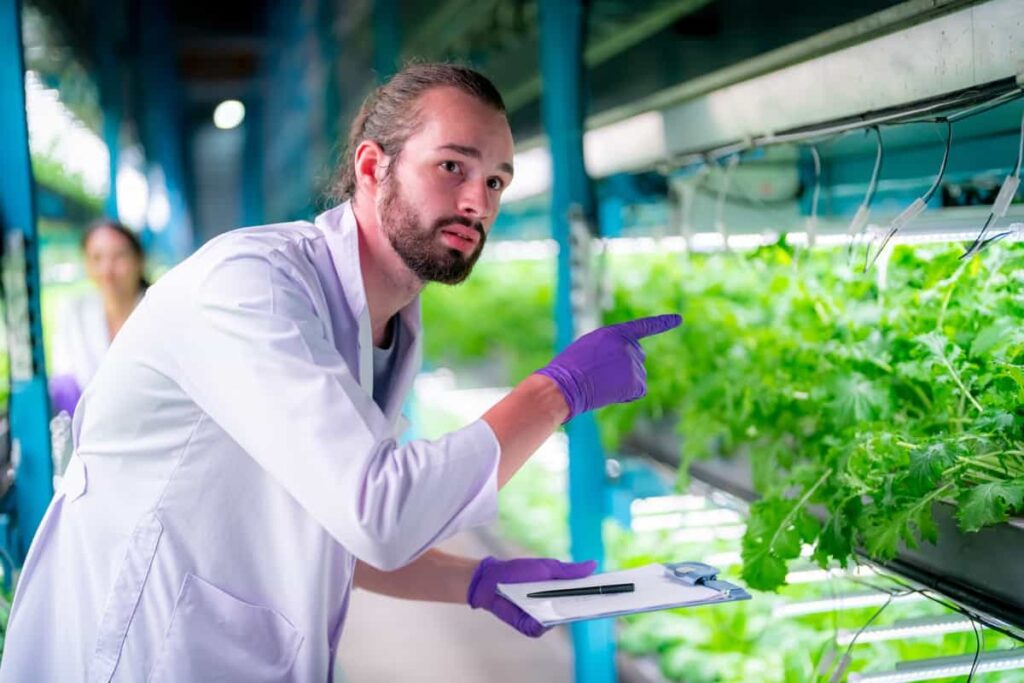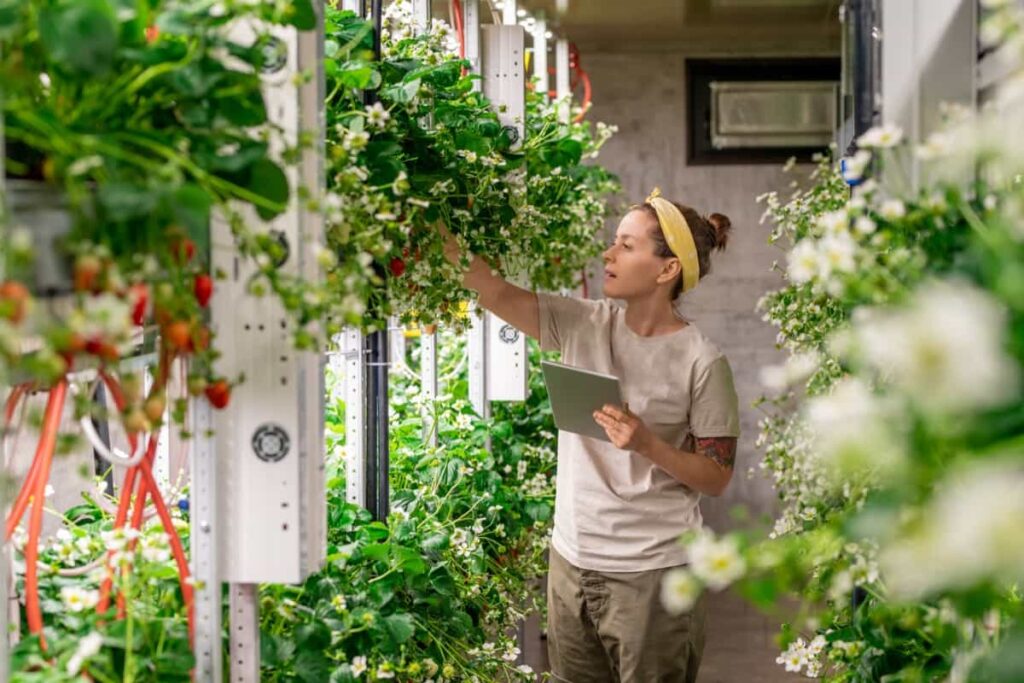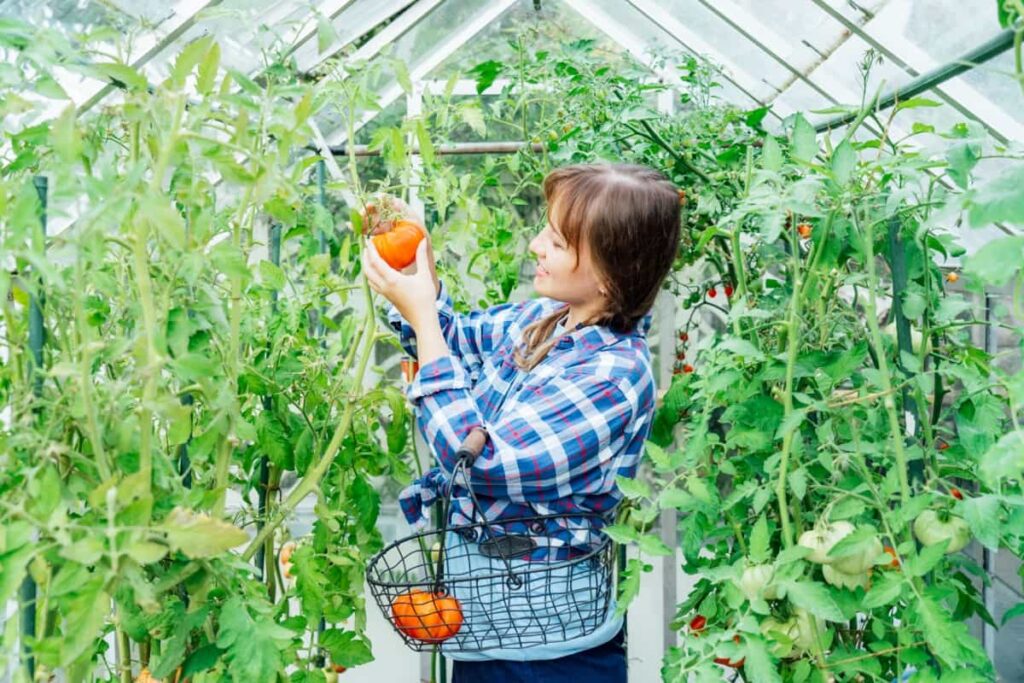Urban farming in Bengaluru is an innovative approach to addressing environmental concerns and enhancing urban sustainability. By integrating agricultural practices into the cityscape, urban farming seeks to reduce CO2 emissions, a vital step in mitigating climate change. This method of farming not only helps in reducing the carbon footprint but also brings multiple benefits to urban areas. It makes cities more sustainable and liveable by promoting green spaces and local food production.

As urban farming gains momentum in Bengaluru, it demonstrates how farming can reduce the carbon footprint by minimizing the transportation of food, using vacant urban spaces productively, and incorporating greenery to absorb CO2. These initiatives are crucial in creating a balance between urban development and environmental stewardship.
Urban Farming in Bengaluru
Benefits of Urban Farming in Bengaluru
Urban farming in Bengaluru offers a plethora of benefits, significantly contributing to the city’s health and environment. Firstly, it aids in reducing the city’s carbon footprint by localizing food production, thus cutting down on transportation emissions. Additionally, urban farms absorb carbon dioxide, a key factor in addressing climate change.
These farms also enhance biodiversity and provide habitats for various species. Moreover, they contribute to the thermal regulation of the city, helping to mitigate the urban heat island effect by cooling the surroundings. The fresh produce from these urban farms leads to improved nutrition for local communities, fostering a connection between residents and their food sources.
Challenges of Urban Farming in Bengaluru
Despite its benefits, urban farming in Bengaluru faces several challenges. One of the primary obstacles is the scarcity of suitable land amidst the city’s dense urban sprawl. Limited space in urban areas hampers the expansion of farming activities. Moreover, soil contamination and poor air quality in some parts of the city can adversely affect crop growth and yield.
Water scarcity, an ongoing issue in Bengaluru, also impacts urban farming, as the consistent water supply is crucial for agriculture. Furthermore, financial constraints can be a barrier, as setting up and maintaining an urban farm requires initial investment and resources. These challenges necessitate innovative solutions and support from various sectors to ensure the successful implementation and sustainability of urban farming in the city.
Community Engagement in Urban Farming in Bengaluru
In Bengaluru, getting the community involved is super important for urban farming to work. People in the neighborhood are joining in more, which makes them feel like they own and care for their surroundings. This involvement not only educates residents about sustainable living but also strengthens community bonds.
In case you missed it: Vertical Hydroponic Farming: A Growing Trend In Urban Agriculture

Community-driven urban farms become spaces for learning and sharing knowledge about farming techniques, sustainable practices, and environmental conservation. They encourage residents, especially the youth, to participate actively in greening their city and understanding the importance of local food systems. Such engagement also promotes inclusivity, as people from diverse backgrounds come together for a common goal.
Sustainable Practices for Urban Farming in Bengaluru
In Bengaluru, sustainable practices in urban farming are essential for maximizing its environmental benefits. These practices include using organic farming techniques, which avoid harmful pesticides and fertilizers, thus protecting the soil and local ecosystems. Rainwater harvesting is another key practice, addressing water scarcity by efficiently utilizing available rainwater for irrigation.
Implementing vertical farming and rooftop gardens optimizes the use of limited urban space, allowing for more greenery in the city. Composting organic waste not only provides nutrient-rich soil for urban farms but also reduces waste sent to landfills. Also, when urban farms use renewable energy sources such as solar panels, it reduces their impact on the environment by producing less carbon pollution.
Government Support for Urban Farming in Bengaluru
The role of government support is crucial in fostering urban farming in Bengaluru. Government initiatives and policies can provide the necessary impetus for this sustainable practice to flourish. Financial incentives, subsidies, or grants for urban farming projects can alleviate some of the financial burdens faced by urban farmers. The government can also facilitate the availability of suitable land for urban agriculture through policy measures or by repurposing unused public spaces.
Providing training and resources to local communities can help in skill development and increase awareness about sustainable farming practices. Government support in terms of research and development can lead to innovations in urban farming, making it more efficient and sustainable. Moreover, incorporating urban farming into city planning and development strategies can ensure its long-term viability and integration into the urban fabric of Bengaluru.
Innovative Techniques for Urban Farming in Bengaluru
Bengaluru’s urban farming scene is thriving with innovative techniques that maximize output and sustainability. One such technique is hydroponics, where plants are grown in nutrient-rich water without soil, reducing water usage and increasing crop yields. Aquaponics is a clever way to grow plants and fish together. It makes a teamwork environment where fish waste feeds the plants, and the plants keep the water clean for the fish.
In case you missed it: Advancing Sustainable Agriculture through Germany Greenhouse Farming

These methods are particularly suited to urban settings due to their space efficiency and low reliance on natural soil and water resources. Additionally, the use of lightweight and portable growing containers has enabled the transformation of unconventional spaces like balconies and terraces into productive green areas.
Economic Viability of Urban Farming in Bengaluru
The economic viability of urban farming in Bengaluru is increasingly evident. Urban farms can be a source of income for city dwellers, either by selling produce directly to consumers or through partnerships with local businesses and restaurants. Moreover, urban farming reduces household food expenses as residents can grow a significant portion of their fresh produce.
The reduced cost of transportation and storage for locally grown food also contributes to the overall economic efficiency. Additionally, urban farming creates job opportunities in the city, particularly in areas like farm management, distribution, and education. Furthermore, urban farming can boost local economies by promoting agri-tourism and community-based markets.
Role of Technology in Urban Farming in Bengaluru
Precision farming techniques, which involve the use of sensors, GPS, and data analytics, allow for optimal resource usage and crop health monitoring. Smartphone apps and IoT (Internet of Things) devices enable urban farmers to monitor and control their farming environments remotely. For instance, automatic watering systems and climate-controlled greenhouses can be managed via smartphones, making urban farming more accessible and manageable.
Drones are being used for aerial monitoring of large urban farms, providing valuable data on crop health and growth patterns. The integration of technology in urban farming not only maximizes productivity but also helps in conserving resources like water and soil, making urban agriculture more sustainable in the long run.
In case you missed it: Organic Greenhouse Farming Cost in India: Estimation Per Square Foot and 1 Acre

Conclusion
Urban farming in Bengaluru is emerging as a key player in the city’s quest for sustainability and reduced carbon footprint. Through innovative techniques, economic viability, and the integration of technology, urban agriculture is transforming the landscape of Bengaluru, making it more sustainable and liveable.
- Aquaponic Farming at Home: A Step-By-Step Guide
- Profitable Village Farming Business Ideas in 2024
- High-Yield Aquaculture: Fast-Growing Fish for Farming
- Effective Fish Pond Construction Techniques for Beginners
- Irrigation and Water Management in Pineapple Farming
- Blossom to Harvest: Mastering Flowering and Pollination in Papaya Farming
- Pig Fattening Essentials: From Selection to Sale for Beginners
- Raising Wagyu Cattle: A Complete Guide for Premium Beef Production
- Soil Types and Their Water Holding Capacity
